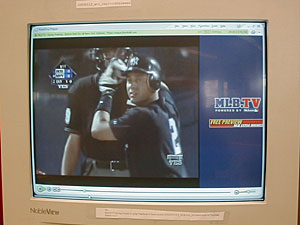|
Audio
Photos
Resources
Your Voice
|
Internet sports broadcasts may compete with TV
April 8, 2003
 |
| To access MLB.tv, you need a high-speed Internet connection. The fee is $14.95 per month, or $79.95 for the season. You cannot watch local teams in their own markets. (Major League Photo) |
New York, NY — Just a few years ago, Major League Baseball blocked radio stations from simulcasting games on the Internet. The feared the Internet would steal revenue from the league and its broadcasters. Now, it’s a very different story. “It was just a matter of time before they embraced the Internet, and they've embraced it enthusiastically and aggressively,” said Andrew Zimbalist, a Smith College professor who specializes in the economics of sports.
Last season, 950,000 people signed up for the league’s GameDay Audio service at $14.95 a month. MLB expects 25,000 people to buy the new video package, MLB.TV, this year.
MLB.TV will broadcast more than a thousand games in the 2003 season, using technology that blacks out local teams in their home markets. Fans will pay $14.95 per month, or $79.95 for the entire season. A pay-per-view option goes for $2.95 a game. Viewers need high-speed Internet connections, such as DSL or cable modems, to see the games. Dial-up users are out of luck.
|
Half the fans of the Minnesota Twins do not live in Minneapolis. They live around the world.
- Bob Bowman, Major League Baseball |
"We sacrificed the numbers of people that might be able to enjoy games, and made it better for those who can," said Bob Bowman, chief executive of MLB Advanced Media. More than one week into the season, the service seems to be working as advertised. Quality is not as high as television broadcasts, but it’s probably acceptable to most viewers -- especially the cubicle-bound worker.
A key to success for MLB.TV is avoiding conflict with local and national television broadcasters, who pay billions of dollars for game rights. Broadcasters don’t want to lose viewers to the Internet. MLB.TV will try to avoid that by reading the Internet Protocol address of individual computers. Most of the time, IPs can reveal your zip code. You won’t be able to see the Minnesota Twins on your computer if you live in the Twins broadcast markets.
However, sophisticated users could fool the system by using proxy servers or anonymizers, which don’t reveal your location. Even so, Zimbalist doesn’t see a threat to television. “I don’t anticipate that it’s going to cannibalize the contracts that currently exist. In fact, over time it generates more interest and excitement in the game because there is more product out there for fans to enjoy,” he said.
With MLB.TV, baseball is aiming at younger fans, the tech-savvy, and overseas viewers. MLB claims there is a large demand for out-of-market games. "Half the fans of the Minnesota Twins do not live in Minneapolis. They live around the world," said Bowman.
The growth of broadband Internet is making services such as MLB.TV feasible when they were not practical only a few years ago. More than a third of all U.S. Internet users use broadband connections at home or work, according to ComScore Networks.
The war in Iraq is tempting many news-hungry consumers to try online video for the first time, and this could also benefit MLB.TV and other online video services. “We are seeing in the last few weeks that increasing number of people are paying for video,” said ComScore Vice President Dan Hess. “Events like the war drive people that might not have otherwise considered Internet video services to try them out.”
MLB.TV could benefit baseball in another way. Baseball’s Web holdings are jointly owned by all all teams, so revenue is divided equally. The Expos stand to earn as much as the Yankees. “Insofar as baseball has had a competitive balance problem that last 10 years or so, this will help alleviate it,” said Zimbalist.
Last year, MLB.com turned cash-flow positive, attracting almost 500 million unique visitors. Zimbalist estimates it will generate up to $60 million in revenue this year.
Will other sports leagues follow baseball’s lead? Probably not in the near term. Hockey is difficult to follow on television, much less a small corner of a computer screen. Football has a deal for out-of-market games with DirecTV. The NBA has expressed little interest in online video for now. “Baseball is out in front, and they will be out there alone for at least another couple of years,” said Zimbalist.
|
News Headlines
|
Related Subjects
|
